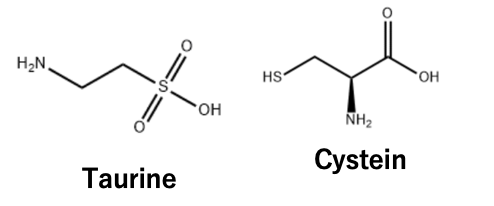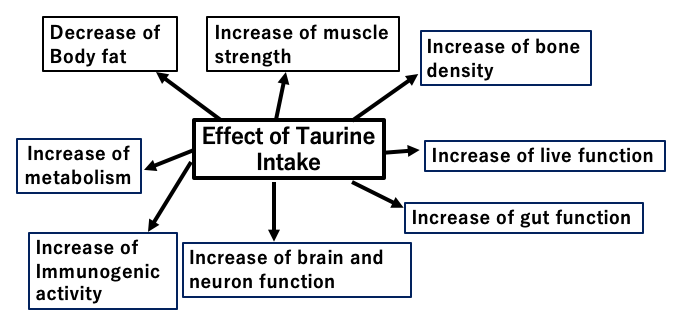
Live Longer with Taurine
What role does Taurine play in our body? Recently, an interesting science paper in the prestigious international journal Science (P. Singh et al. Taurine deficiency as a driver of aging. Science (2023) 9th June issue) has demonstrated the relationship of this fascinating element to the aging process and a variety of physiological functions. Let’s take a look at a summary of the research results here.
Although Taurine is a chemical similar in structure to amino acids, it is not a component of proteins. Naturally occurring in seafood like octopus and squid but not in plants, dozens of grams of Taurine in its free form are also found in our muscles and other bodily tissues. As it may help to regulate cellular osmolality tied to our body’s water-electrolyte balance (H. Ohmori, and H. Yada, Frontier of Taurine research (in Japanese) Tairyoku kagaku, (2020) 69, p123), Taurine has become widely known as an ingredient in “energy drinks” commonly found at pharmacies and convenience stores.

Newborn babies initially have little Taurine, but receive it from breastmilk. If Taurine blood levels in babies is taken as 100 percent, the level decreases to 20 percent by age 60. A similar decrease has been observed in the bodies of mice and an experimental worm nematode as well. Cats are known to be unable to synthesize Taurine and must therefore rely on sources outside of their body. A genetically modified cat in which the gene for taurine transport was knocked out was not only unable to absorb Taurine into its blood cells, but also suffered from blindness. The moisture needed to maintain ocular vision may have been lost.
In research by P. Singh et al. on mice, the effects of Taurine supplementation were tested. Middle-aged mice were fed with or without Taurine in their diet until their death. Those that consumed additional Taurine lived 10-20 percent longer than the control mice that received no Taurine supplement. Mice fed with Taurine also exhibited decreases in blood pressure and blood glucose levels, as well as a slower decrease in liver function. These physiological effects were analyzed in detail, including analysis of genetic predisposition, and chromosome shortening often observed in aging. In the end, no negative effects were observed. Therefore, the paper’s results seem to strongly suggest that Taurine deficiency is a driver of aging.


Our institute has reported on several elements that seem to extend life spans, such as NMN (Nicotine amide mononucleotide, (2020) 11th Dec.) . Taurine may be one more key that unlocks the secret to a longer life.
